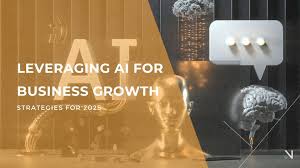Artificial intelligence has become one of the most transformative forces in today’s business environment. It is no longer a futuristic concept but a practical tool that companies of all sizes are using to enhance operations, improve decision-making, and deliver better customer experiences. Businesses that embrace AI are finding new ways to scale, compete, and remain relevant in highly competitive markets. Understanding how to leverage AI for growth strategies can provide a significant advantage.
Enhancing Customer Experience with AI
One of the most direct ways AI drives business growth is through improved customer experience. Consumers today expect quick responses, personalized interactions, and seamless service. AI-powered tools such as chatbots, virtual assistants, and recommendation engines make this possible.
Chatbots handle customer queries instantly, providing support around the clock. Virtual assistants guide users through services in a personalized way, while recommendation systems suggest products tailored to individual needs. Together, these solutions not only save businesses time but also build stronger customer loyalty by making every interaction smooth and engaging.
Improving Decision-Making with Data Insights
AI excels in analyzing vast amounts of data that humans cannot easily process. Businesses generate enormous amounts of information from sales, marketing, operations, and customer behavior. AI systems can interpret this data, spot patterns, and provide actionable insights.
For example, predictive analytics can forecast demand for products, helping companies manage inventory more effectively. AI-driven dashboards allow executives to make decisions backed by data rather than guesswork. This reduces risks, improves efficiency, and positions businesses to seize opportunities faster than competitors.
Streamlining Operations and Reducing Costs
Efficiency and cost reduction are at the core of growth strategies, and AI offers powerful solutions in this area. Automation through AI allows businesses to handle repetitive tasks without human involvement, freeing employees to focus on higher-value responsibilities.
Examples include:
- Automating payroll, invoicing, and expense management.
- Using AI-powered logistics to optimize delivery routes and reduce fuel costs.
- Applying machine learning to detect inefficiencies in production lines.
By reducing time wastage and minimizing errors, companies save money while increasing productivity. This operational agility gives them more room to reinvest in growth initiatives.
Personalizing Marketing Strategies
Marketing has evolved from one-size-fits-all campaigns to highly personalized experiences, largely thanks to AI. Machine learning tools analyze customer preferences and behaviors, enabling businesses to target individuals with messages that resonate with them.
Personalized emails, tailored advertisements, and predictive product suggestions all increase engagement rates. AI tools can also determine the best time to reach customers, the right channel to use, and the content that is most likely to convert. As a result, businesses can improve their return on investment while building deeper customer relationships.
Strengthening Cybersecurity
As businesses expand digitally, cybersecurity becomes a critical growth consideration. Cyber threats not only cause financial losses but can also damage reputation and customer trust. AI offers advanced protection by identifying suspicious activities faster than traditional systems.
Machine learning algorithms detect unusual patterns in network traffic, flagging potential breaches before they escalate. AI also helps automate threat detection and response, ensuring that businesses remain secure without overwhelming IT teams. By safeguarding data and systems, businesses protect their growth strategies from potential disruptions.
Driving Innovation in Products and Services
AI is not only about improving what already exists; it is also about creating entirely new opportunities. Companies are using AI to innovate products and services that meet evolving consumer needs.
For example, AI-driven health applications provide personalized wellness recommendations. Retail businesses use augmented reality combined with AI to help customers visualize products before purchase. Financial institutions deploy robo-advisors that simplify investment decisions for clients.
Innovation fueled by AI not only attracts new customers but also creates unique value propositions that distinguish businesses from competitors.
Optimizing Human Resources Management
AI is changing the way companies recruit, train, and manage employees. Recruitment platforms powered by AI can scan resumes, identify the most suitable candidates, and even conduct preliminary assessments. This reduces hiring time while ensuring better matches between roles and candidates.
Beyond hiring, AI helps personalize employee training programs by analyzing individual performance and recommending targeted learning modules. Workforce analytics also enable managers to predict turnover and take proactive measures to retain talent. By building a more effective workforce, businesses strengthen their capacity for long-term growth.
Expanding into Global Markets
For businesses aiming to reach international audiences, AI offers powerful tools for overcoming language and cultural barriers. AI-powered translation services allow seamless communication with customers across the world. Automated systems also analyze local market trends, giving companies insights into consumer behavior in different regions.
These capabilities make it easier to expand globally without the heavy costs traditionally associated with international business. With AI, companies can adapt marketing, product offerings, and customer service to meet the needs of diverse markets more efficiently.
Monitoring Performance with AI Analytics
Growth strategies require constant monitoring, and AI provides the means to do so effectively. Advanced analytics platforms track business performance in real time, from sales and customer satisfaction to supply chain performance. AI models also provide predictive insights, enabling businesses to anticipate challenges before they arise.
This level of monitoring ensures that strategies are flexible and adaptable. Companies can identify what is working, make quick adjustments, and stay aligned with their long-term goals. Continuous monitoring through AI reduces the risk of stagnation and supports sustainable growth.
Conclusion
Artificial intelligence is no longer just a technological advantage; it is a growth enabler for businesses across all industries. By enhancing customer experiences, improving decision-making, streamlining operations, and fueling innovation, AI helps companies build stronger foundations for success. It enables businesses to reduce costs, personalize marketing, strengthen cybersecurity, and expand into global markets.
For organizations seeking sustainable growth, adopting AI-driven strategies is not optional but necessary. The businesses that thrive in the future will be those that embrace AI today, leveraging its capabilities to stay competitive, relevant, and innovative.



